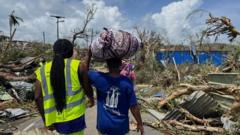An overview of 2024 reveals the pressing toll of climate change against a backdrop of delayed global negotiations.
The Human Cost of Climate Change: A Year in Review

The Human Cost of Climate Change: A Year in Review
As extreme weather events escalate, the urgent need for action grows.
Every month of 2024 has demonstrated the escalating impact of climate change, characterized by unprecedented floods, destructive wildfires, and record-breaking heat waves. The urgency of global leaders to address these challenges has never been more paramount, yet negotiations remain hindered by financial disputes.
The situation is depicted starkly at a climate conference in Azerbaijan, where discussions aimed at reducing carbon emissions clash with the grim realities experienced by millions worldwide. Outside the convention halls, regions are grappling with the devastating consequences of climate inaction.
January marked the beginning of a year forecasted to be the hottest on record, recording unseasonably warm temperatures—80 degrees in Washington D.C. on January 26.
February brought drought to Southern Africa, critically impacting the maize crop—a staple food—just when it needed irrigation. With prolonged dry spells due to El Niño compounded by climate change, an estimated 27 million people faced severe food shortages, a crisis exacerbated by dwindling livestock and crops. For example, in Kanyemba village, communal farmer Ladias Konje stood amidst her parched maize field, reflecting the desperate situation many are facing.
As the world confronts a turning point in policy and environment, the disconnect between global talks and the harsh realities of climate change continues to widen, underscoring the need for immediate and effective interventions.





















